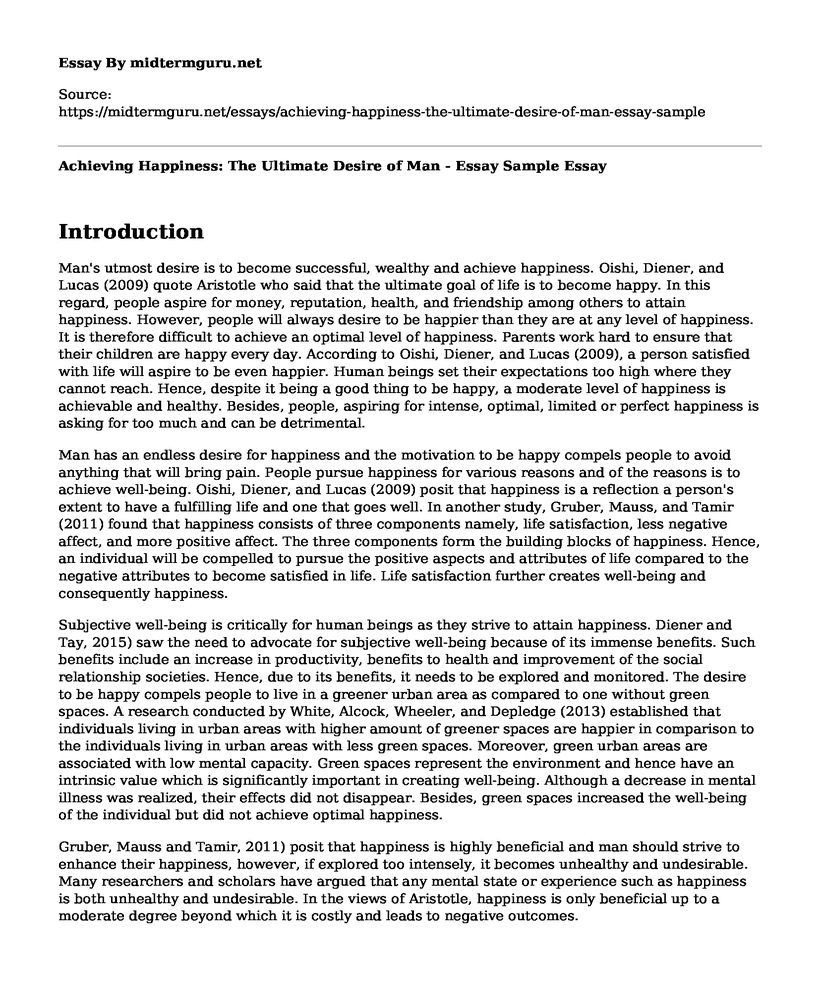Introduction
Man's utmost desire is to become successful, wealthy and achieve happiness. Oishi, Diener, and Lucas (2009) quote Aristotle who said that the ultimate goal of life is to become happy. In this regard, people aspire for money, reputation, health, and friendship among others to attain happiness. However, people will always desire to be happier than they are at any level of happiness. It is therefore difficult to achieve an optimal level of happiness. Parents work hard to ensure that their children are happy every day. According to Oishi, Diener, and Lucas (2009), a person satisfied with life will aspire to be even happier. Human beings set their expectations too high where they cannot reach. Hence, despite it being a good thing to be happy, a moderate level of happiness is achievable and healthy. Besides, people, aspiring for intense, optimal, limited or perfect happiness is asking for too much and can be detrimental.
Man has an endless desire for happiness and the motivation to be happy compels people to avoid anything that will bring pain. People pursue happiness for various reasons and of the reasons is to achieve well-being. Oishi, Diener, and Lucas (2009) posit that happiness is a reflection a person's extent to have a fulfilling life and one that goes well. In another study, Gruber, Mauss, and Tamir (2011) found that happiness consists of three components namely, life satisfaction, less negative affect, and more positive affect. The three components form the building blocks of happiness. Hence, an individual will be compelled to pursue the positive aspects and attributes of life compared to the negative attributes to become satisfied in life. Life satisfaction further creates well-being and consequently happiness.
Subjective well-being is critically for human beings as they strive to attain happiness. Diener and Tay, 2015) saw the need to advocate for subjective well-being because of its immense benefits. Such benefits include an increase in productivity, benefits to health and improvement of the social relationship societies. Hence, due to its benefits, it needs to be explored and monitored. The desire to be happy compels people to live in a greener urban area as compared to one without green spaces. A research conducted by White, Alcock, Wheeler, and Depledge (2013) established that individuals living in urban areas with higher amount of greener spaces are happier in comparison to the individuals living in urban areas with less green spaces. Moreover, green urban areas are associated with low mental capacity. Green spaces represent the environment and hence have an intrinsic value which is significantly important in creating well-being. Although a decrease in mental illness was realized, their effects did not disappear. Besides, green spaces increased the well-being of the individual but did not achieve optimal happiness.
Gruber, Mauss and Tamir, 2011) posit that happiness is highly beneficial and man should strive to enhance their happiness, however, if explored too intensely, it becomes unhealthy and undesirable. Many researchers and scholars have argued that any mental state or experience such as happiness is both unhealthy and undesirable. In the views of Aristotle, happiness is only beneficial up to a moderate degree beyond which it is costly and leads to negative outcomes.
Conclusion
In conclusion, extreme or optimal levels of happiness cannot be achieved since asking for optimal levels of happiness is asking for too much which life cannot give. Asking for too much is detrimental to the life of an individual and leads to negative outcomes.
References
Diener, E., & Tay, L. (2015). Subjective well-being and human welfare around the world as reflected in the Gallup World Poll. International Journal of Psychology, 50(2), 135-149. DOI: 10.1002/ijop.12136
Gruber, J., Mauss, I., & Tamir, M. (2011). A Dark Side of Happiness? How, When, and Why Happiness Is Not Always Good. Perspectives on Psychological Science, 6(3), 222-233. DOI: 10.1177/1745691611406927
Oishi, S., Diener, E., & Lucas, R. (2009). The Optimum Level of Well-Being: Can People Be Too Happy? Social Indicators Research Series, 175-200. DOI: 10.1007/978-90-481-2350-6_8
White, M., Alcock, I., Wheeler, B., & Depledge, M. (2013). Would You Be Happier Living in a Greener Urban Area? A Fixed-Effects Analysis of Panel Data. Psychological Science, 24(6), 920-928. DOI: 10.1177/0956797612464659
Cite this page
Achieving Happiness: The Ultimate Desire of Man - Essay Sample. (2023, Jan 29). Retrieved from https://midtermguru.com/essays/achieving-happiness-the-ultimate-desire-of-man-essay-sample
If you are the original author of this essay and no longer wish to have it published on the midtermguru.com website, please click below to request its removal:
- Career Summary in Volunteer Care
- Individual Change - Paper Example
- Paper Example on Ethnic Discrimination
- Research Paper on Social, Moral Issues
- Understaffed Non-Profit Seeks Volunteers: SAAFE House Crisis Intervention - Essay Sample
- Professional Communication & Personal Effectiveness in Nursing - Essay Sample
- Family Get-Together: Celebrating Credibility & Purpose - Essay Sample







